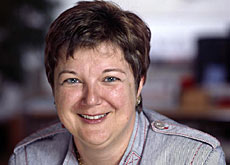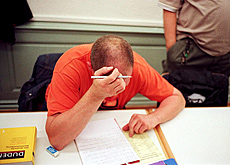Government is “unreliable” education partner

The new head of the body representing Switzerland's cantonal boards of education talks to swissinfo about the fight against government plans to cut funding.
Isabelle Chassot, who took over as president of the Swiss Conference of Cantonal Ministers of Education on July 1, describes some of the main challenges facing the country’s education system.
Earlier this year, voters said yes to a constitutional amendment on education, which does not infringe on the 26 canton’s autonomy in education matters but obliges them to harmonise the main aspects of the system.
At the beginning of July, when Chassot took office, the government voted to limit its increase in funding for training, research and innovation for the three-year period starting in 2008.
swissinfo: Did you imagine such a bumpy start?
Isabelle Chassot: No. I really didn’t think that I’d be facing a major issue straight away. And especially not having to fight government decisions by trying to get them changed in parliament.
swissinfo: What do you think about the government’s plan to reduce its legal requirements to fund education?
I.C.: The government has an important responsibility in this affair that it still doesn’t fully understand. Its plan to revise laws that allow cantons to receive considerable funding support for education, resarch and innovation is beyond comprehension.
Last May the Swiss people and cantons voted in favour of a new amendment to the constitution concerning education, which makes the government and the cantons partners.
But the government’s present strategy is turning it into an “unreliable” partner, especially as we were expecting it to increase its support in this area.
swissinfo: If the government sticks to its current position, do you think the harmonisation of education, as outlined in the Bologna Declaration (to create a European Higher Education Area by 2010), is under threat?
I.C.: The Bologna Declaration represents a major change; it’s not just about replacing one diploma with another. It requires a redefinition of our schooling; for example, from the start of term this year, universities of applied science are offering new subjects.
Because the government is only proposing a 4.5 per cent increase in funding, the whole thing could be in jeopardy and the same goes for the quality of education and Swiss competitiveness internationally.
swissinfo: How do you plan to tackle the harmonisation of the Swiss education system?
I.C.: The first agreement on education coordination in 1970 fixed the structural guidelines, such as school starting age and the length of compulsory schooling. We are now taking this further and we want to harmonise objectives as people’s living standards have changed. The nationwide vote on May 21 proves that the Swiss are looking for change.
Schools should meet the new requirements of single parents or working couples. They should play a subsidiary role rather than replace parents, keeping in mind changes in society.
We believe that a child should start compulsory schooling at the age of four and that it should last 11 years.
We also want to harmonise educational objectives by agreeing on what a student should learn during his studies. We don’t want to standardise the content; that responsibility is delegated to each linguistic region. Here I’m referring to language learning, of course.
swissinfo: What are the main values that people should learn at school?
I.C.: Equality, fairness, freedom, responsibility and democracy. Schools should also help students integrate. Otherwise, their aim should be to pass on knowledge. Part of our political responsibility is for our children to master certain skills.
But it’s not enough to know how to read, write, count and do sums; schools should also aim to teach children how to become members of society, and they should introduce them to the world of art and look at ethical questions.
I am aware that an all too high percentage of students leave school without learning the basic skills, and this is unacceptable.
swissinfo: What do you think about the quality of education in Switzerland?
I.C.: We shouldn’t underestimate ourselves. The level of education here is high and immigrants are well integrated. We have the highest share of young people finishing secondary education or vocational training.
But we also have to accept a certain number of shortcomings. The 2003 Pisa study showed that Switzerland’s education system is not one of the world’s best. For our students sake we need to insist on achieving excellence.
swissinfo-interview, Mathias Froidevaux with Emilie Bay
Switzerland spends SFr11,000 annually on each student – SFr3,000 more than the average for 29 OECD countries.
In 2003 Switzerland spent SFr26 billion on education – the cantons spent SFr22.3 billion and the government spent SFr3.5 billion; the government also finances the two federal institutes of technology.
On May 21, 2006 the Swiss people and cantons voted in favour of a constitutional amendment concerning education. The cantons maintain their autonomy in education matters but are obliged to harmonise the main aspects of the education system.
At the beginning of July 2006, the government voted to limit its increase in funding for training, research and innovation to 4.5% for the 2008-2011 period.
Under Switzerland’s federalist system the country’s 26 cantons enjoy a large degree of autonomy in education matters. And, together with each community, they are largely responsible for the financing of education (90%).
The Bologna Declaration of 1999 aims to create a European Higher Education Area by 2010. Switzerland is one of 45 countries in Europe that signed up to the accord, whose aim is to harmonise European higher education to make it more attractive internationally.

In compliance with the JTI standards
More: SWI swissinfo.ch certified by the Journalism Trust Initiative



You can find an overview of ongoing debates with our journalists here. Please join us!
If you want to start a conversation about a topic raised in this article or want to report factual errors, email us at english@swissinfo.ch.